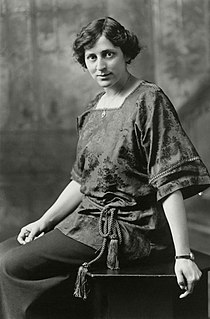A Quote by Maimonides
All the evils that men cause to each other because of certain desires, or opinions or religious principles, are rooted in ignorance. [All hatred would come to an end] when the earth was flooded with the knowledge of God.
Related Quotes
The prophet Isaiah ... points out what will be the cause of this change; for he says that hatred, quarrel, and fighting will come to an end, because men will have a true knowledge of God. "They shall not hurt nor destroy in all my holy mountain: for the earth shall be full of the knowledge of the Lord, as the waters which cover the sea" (Isa. xi. ver. 9) Note it.
I don't believe there is one woman within the confines of this state who does not believe in birth control. I never met one. That is, I never met one who thought that she should be kept in ignorance of contraceptive methods. Many I have met who valued the knowledge they possessed, but thought there were certain other classes who would be better kept in ignorance. The old would protect the young. The rich would keep the poor in ignorance. The good would keep their knowledge from the bad, the strong from the weak.
If Christianity were true religious persecution would become a pious and charitable duty: if God designs to punish men for their opinions it would be an act of mercy to mankind to extinguish such opinions. By burning the bodies of those who diffuse them many souls would be saved that would otherwise be lost, and so there would be an economy of torment in the long run. It is therefore not surprising that enthusiasts should be intolerant.
Knowledge has two extremes. The first is the pure natural ignorance in which all men find themselves at birth. The other extreme is that reached by great minds, who, having run through all that men can know, find they know nothing, and come back again to that same natural ignorance from which they set out; this is a learned ignorance which is conscious of itself.
Then it was as if I suddenly saw the secret beauty of their hearts, the depths of their hearts where neither sin nor desire nor self-knowledge can reach, the core of their reality, the person that each one is in God's eyes. If only they could see themselves as they really are. If only we could see each other that way all the time, there would be no more war, no more hatred, no more cruelty, no more greed . . . I suppose the big problem would be that we would fall down and worship each other.
Systems of religious error have been adopted in times of ignorance. It has been the interest of tyrannical kings, popes, and prelates to maintain these errors. When the clouds of ignorance began to vanish and the people grew more enlightened, there was no other way to keep them in error but to prohibit their altering their religious opinions by severe persecuting laws. In this way persecution became general throughout Europe.
Men have looked away from themselves and at things so long that they have come to esteem the religious, learned and civil institutions as guards of property, and they deprecate assaults on these, because they feel them to be assaults on property. They measure their esteem of each other by what each has, and not by what each is.
An irreligious man is not one who denies the gods of the majority, but one who applies to the gods the opinions of the majority. For what most men say about the gods are not ideas derived from sensation, but false opinions, according to which the greatest evils come to the wicked, and the greatest blessings come to the good from the gods.



































